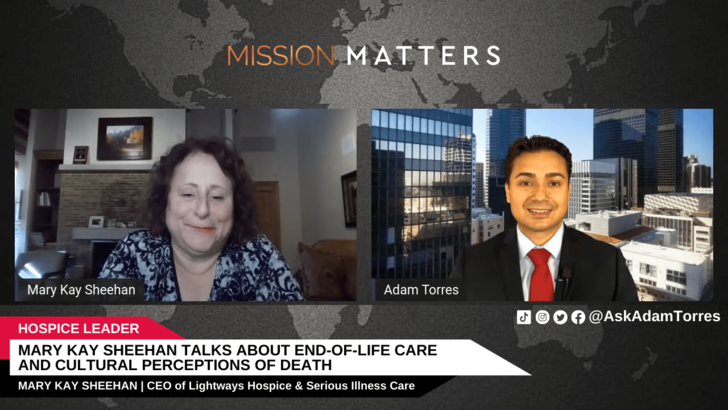Mary Kay Sheehan believes in transparency, honesty, and compassion; these traits are what led her to become an oncology nurse and, now, a hospice leader.
Listen to the complete interview of Mary Kay Sheehan with Adam Torres on Mission Matters Innovation Podcast.
Why is talking about death so taboo in the US?
Sheehan notes that superstition and dissonance can play a role in our cultural hesitation to talk openly about death. “I believe that people think if we talk about it, it will happen,” she says. “If people talk about planning for you, even when we're healthy, they're afraid to do that because we think it will bring it on somehow. The second thing is, people want to keep (an) emotional distance between life and death. That's why we use words like ‘passing away,’ ‘rainbow bridge,’ ‘transitioning,’ and ‘we “lost” somebody’ instead of saying somebody died.”
This form of distancing, she notes, may seem less painful for some, but a more direct approach to the topic can actually be preferable for others.
Lightways Hospice Care & Serious Illness Care
Lightways, previously known as Joliet Area Community Hospice, is a nonprofit hospice and palliative care program.
“We are currently taking care of about 800 patients and families daily throughout the area,” Sheehan says. “Most of our patients are either in nursing homes or at their homes, but we also have an inpatient hospice unit. We take care of patients of all diagnoses and ages, and we have a pediatric program for children with serious illnesses. Our team of professionals takes care of these patients and follows their wishes.”
Especially during the COVID era, how do you help people deal with grief?
"I think that grief has a greater impact than we can imagine,” Sheehan notes. “If a family member dies, his whole family suffers mentally and financially. Most hospices offer community bereavement, which is open to anybody in the community who's had a loss. We provide support groups, one-on-one counseling sessions, memorial services, anything that (is needed).”
“Everyone's a little different in their grief,” she continues. “So first, you have to recognize that you're having symptoms of grief—sadness, apathy, and feeling like you don’t want to participate in life. Grief is a serious issue, and not being ashamed to ask for help is essential.” For those near the end of life or who are grieving the recent or impending loss of a loved one, she suggests calling a local hospice, whose team can guide you through the process in a way that actually acknowledges your grief and helps you through it.
Taking care of—and being open with—the dying
Sheehan has seen firsthand the toll that distancing ourselves from the reality of death can take, particularly on dying patients themselves.
"Talking to the physician and finding out the prognosis will help you a lot,” she says. “It's hard to ask, but the doctor will tell you.” She also notes the importance of delineating loved ones’ responsibilities in terms of caring for their loved one near the end of their life, from handling financial concerns to arranging for their comfort.
“Even though you don't think you're dying right now, hospice can be there for months, years,” she says, and urges people to reach out even before they may think they need to.
“Don't be afraid to call your hospice and ask for help. People don't know how to take care of somebody who's dying, so they need help. That's the biggest thing hospice does,” she explains. “We provide education about what to expect to happen next so that it's not so frightening. You should never be alone in this journey, and that's why we provide unwavering guidance and support for people going through this process and don't know where to turn. It doesn't matter if you have no insurance or no Medicare. As a nonprofit, we take care of anybody regardless of ability to pay."
The road ahead for Lightways
Hospices are becoming a more common or familiar part of the medical community, Sheehan notes, and Lightways is steadfast in its commitment to care for its patients.
“We're planning to reach out to more people and doctors to get to the patients that need us," she says. Lightways, she notes, is equipped with complete teams who work together for each patient to address their specific needs.
“We're also considering telehealth,” she says, noting that the COVID era has changed some patients’ and families’ comfort level with ongoing in-person care. “Some people don't like us in their house every day, so the best way we can keep monitoring them is from afar.”
To learn more about how Lightways can help you or a loved one, visit lightways.org.
Media Communications
Inquiries: [email protected]
Publicist for Adam Torres and Mission Matters Media: KISS PR Brand Story PressWire.
Brand Publicity Partners KissPR.com
For more details, visit Kisspr.com. KISS PR Digital PR & Marketing powers the Mission Matters Business podcast with brand storytelling. T: 972.437.8942
Source: Adam Torres / Co-Founder
Release ID: 93557

